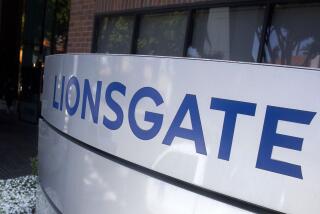Lions Gate Growth Bodes Well for Icahn
Could Hollywood’s last remaining independent studio become billionaire investor Carl Icahn’s next prey?
The veteran corporate raider has accumulated a stake of nearly 4% in Lions Gate Entertainment Corp., the company behind the Oscar-winning film “Crash” and the horror franchise “Saw.”
Icahn has built an $8-billion fortune buying shares of underperforming companies such as Blockbuster Inc. and TWA and pressuring them to sell off assets or cut costs to lift share prices.
He forced Time Warner Inc. this year to cut costs and take other measures to increase its stock price after a six-month battle for control of the entertainment giant.
In the case of Lions Gate, a former Icahn protege, Mark Rachesky, is the company’s second-largest shareholder, raising the possibility that the duo could join forces to increase their influence in the company. Rachesky’s MHR Fund Management raised its stake to 10% in December. Icahn disclosed his stake in a regulatory filing last week.
Since investing in Lions Gate in March, Icahn’s representatives have had several conversations with the company’s management, several sources familiar with the discussions said. So far, they say, the tone has been friendly.
“It is incorrect to assume that anytime they invest in anything, there is some evil alternative motive,” said one person, who asked to remain anonymous because the discussions were private.
Icahn did not return a phone call seeking comment. Lions Gate executives declined to comment.
Icahn may see Lions Gate as a growth opportunity.
“He simply wants to make money,” said David Miller, an analyst with Sanders Morris Harris. “This is the last remaining public film library. He recognizes the scarcity value of these assets.”
During the last six years, Lions Gate has grown from a small Canadian independent film label based in North Vancouver to a notable Hollywood player. It projects revenue of $950 million for its fiscal 2006, which ends in March, and analysts expect free cash flow of as much as $100 million. The company is scheduled to report earnings next month.
Lions Gate’s financial performance has been somewhat erratic because of its reliance solely on movies. Its shares dropped to $7.50 in December when the company reduced earnings projections because of weak home video sales. The stock has since rebounded, rising 21 cents to $9.24 on Friday.
Several analysts have “buy” recommendations on the stock in part because Lions Gate is considered an acquisition target.
The company has made a name for itself by producing a stream of low-budget hits such as the horror film “Hostel” and Tyler Perry’s “Madea’s Family Reunion.” Lions Gate’s most reliable source of cash is from its library of 5,600 titles, which generated $351 million in revenue last year and includes hits such as “Dirty Dancing” and “Reservoir Dogs.” Although the company does not own its entire library, significant rights do not begin to expire until 2012.
The company also is beefing up its portfolio. It’s in final negotiations to build a state-of-the-art studio in New Mexico that could be rented out or used to film its own movies. Lions Gate sold its studio in Vancouver this year for $36.1 million.
The company also is reducing its reliance on movies. It plans to launch a horror channel with an as-yet unnamed partner this fall. Lions Gate also has a 29% stake in CinemaNow, which allows customers to download movies.
“The issue becomes: Do they become a major studio before they get snapped up by a larger media company or do they go private?” said Robert Routh, a managing director at Jefferies & Co. “The investment community is realizing the company’s ability to generate a lot of cash on an ongoing basis. Carl sees that.”
More to Read
The biggest entertainment stories
Get our big stories about Hollywood, film, television, music, arts, culture and more right in your inbox as soon as they publish.
You may occasionally receive promotional content from the Los Angeles Times.










